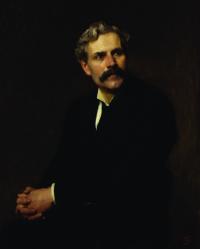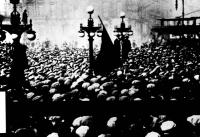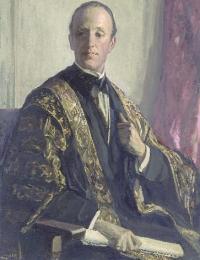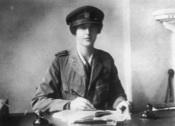Ramsay MacDonald and Ireland
Published in 20th-century / Contemporary History, Features, Issue 5 (Sept/Oct 2010), Volume 18, World War I
Portrait of Ramsay MacDonald by Soloman Joseph Soloman, 1911. (National Portrait Gallery, London)
In the early twentieth century Ramsay MacDonald bestrode the fledgling British Labour Party like a colossus. In 1900 he became secretary of the newly founded Labour Representation Committee; in 1906 he was first elected as a Labour MP; over the following years he served as treasurer, chairman and secretary of the new Labour Party; and he was elected party leader in 1922. His skill as a communicator, whether as an orator or a writer, allied to his administrative and leadership qualities, ensured that MacDonald succeeded in creating a Labour Party in his own image—moderate, constitutional, respectable and responsible. MacDonald is undeniably the founding father of the modern British Labour Party. As the leading British Labour politician of his generation, MacDonald in effect also determined Labour’s Irish policy in that most formative of periods either side of the First World War.
William Walker’s election agent in Belfast
Canning believes that MacDonald’s attitude to Ireland was influenced by his Presbyterian lowland Scots upbringing, but it is more likely that his lifelong view that Irish politics were inherently irrational, emotional and unpredictable was profoundly coloured by his experience as election agent for unionist Labour candidate William Walker in three elections in successive years (1905–7) in the sectarian cockpit of North Belfast. MacDonald’s experiences in Belfast made him acutely and permanently conscious of the irreconcilable and potentially destabilising state of affairs that inevitably arose in any attempt to satisfy Irish self-determination while maintaining the integrity of the United Kingdom. Labour policy on Ireland prior to the First World War consisted of a vague, ill-considered but well-meaning support for Home Rule. After 1918, however, as Irish nationalism became more militant and as the British Labour Party metamorphosed from a peripheral political grouping into an alternative party of government, its policy on Ireland inevitably had to become more focused.
MacDonald’s reputation inside the Labour movement had unlimited credibility during this period. He enjoyed political support across the spectrum of Labour politics, not only because he was clearly the pre-eminent Labour politician of his generation but also because of the personal sacrifice he had made and the opprobrium he had attracted as a result of his opposition to the First World War. As a result, the ‘Red Clydeside’ Labour MPs elected in 1922 supported MacDonald in the first ever contest to elect a Labour Party leader (and, by extension, an alternative Labour prime minister) when MacDonald narrowly defeated the son of an Irish farm worker, J.R. Clynes, in late 1922.
Aimed to replace the Liberals as the alternative governing party

‘Red Clydeside’—workers’ demonstration (with red flag) in George Square, Glasgow, in 1919. The ‘Red Clydeside’ Labour MPs elected in 1922 supported MacDonald in the first ever contest to elect a Labour leader, but by the time the first Labour government fell after only nine months in office they, and other left-wingers, had become disillusioned with his cautious political and economic policies. (Scottish Media Newspapers)
Although MacDonald had been defeated in the 1918 general election and did not return to parliament until 1922, he was responsible in the immediate post-war period in his role of secretary of the party for, together with Arthur Henderson, completely revamping the pre-war Labour Party. Whereas it had once been merely a political vehicle for a section of the industrial working class—trade-unionised male manual workers—it now became a party that, through its newly established constituency parties and individual membership, sought actively to attract middle-class progressives as well as newly enfranchised women voters. This section of the electorate was rapidly becoming disillusioned with the failing fortunes of the Liberal Party as a result of the split between Asquith and Lloyd George, as well as the opportunism and venality of the latter, then in office as head of a Conservative-dominated coalition government.
MacDonald’s overriding ambition for his party was to extend its political attraction beyond trade-unionised workers, to attract progressive voters and thus to replace the Liberal Party as the alternative governing party to the Conservatives. To achieve this it had to demonstrate its moderation, reliability and patriotism so that at some stage in the near future it could be entrusted with the reins of political office. This meant distancing itself from extremism, militancy and, above all, absolving itself from accusations that, in Churchill’s famous phrase, it was not ‘fit for office’.
To MacDonald an increasingly militant Irish politics fell into this category of emotive, irrational and unpredictable activity, with which Labour associated at its peril. This could endanger the whole Labour project of seeking to secure the confidence of the British electorate with the intention of becoming a future government. Between 1918 and 1924, when the first Labour government was elected, MacDonald skilfully manoeuvred Labour policy on Ireland so that the party could never be accused of flirting with extreme Irish nationalism. This was a difficult task, as the Labour leadership was constantly being pressured by elements within its own rank-and-file, as well as by the organised Irish community in Britain, to associate itself more closely with Irish republican aspirations. The party needed to find equilibrium between appearing moderate and responsible to British voters while expressing sufficient enthusiasm for Irish nationalism to at least not alienate Irish voters in Britain. Ultimately, however, MacDonald was able to deflect this pressure, as British Labour Party members were far more interested in the issues of pay, working conditions and unemployment than they were in any sustained involvement or concern with Ireland. Furthermore, the politically organised Irish community in Britain, the Irish Self-Determination League, put itself beyond the political pale by aligning itself with anti-Treaty republicans after 1921.
Support for Ireland and Soviet Russia at 1920 party conference
In order to maintain this distance between an increasingly respectable Labour Party on the verge of office and an increasingly militant Irish nationalism, MacDonald repeatedly had to employ all his skills as a political operator. After years of quiescence on Ireland, 1920 saw a major debate on the subject at the annual conference in Scarborough, which supported Irish self-determination. This was also the year that industrial conflict was at its post-war zenith. British trade unions had established ‘councils of action’ to boycott the export of munitions to Poland and other counter-revolutionary interventions against the fledgling Soviet Russian state. Many also wanted similar action to be taken against the movement of arms to Ireland in support of the counter-insurgency campaign against the IRA. To MacDonald this was anathema—not only did it run the risk of associating the Labour movement with the excesses of militant Irish republicanism in the eyes of the British electorate, but it also ran the risk of once again replacing parliamentary and constitutional activity with industrial militancy, something MacDonald had been working against over his entire career.
Although MacDonald was unable to prevent the 1920 Labour conference from voting for full and unfettered Irish self-determination, the Labour leadership adamantly refused to support any boycott of munitions to Ireland. This renewed emphasis on industrial militancy and away from parliamentary activity may have been a direct result of MacDonald’s absence from the House of Commons between 1918 and 1922. MacDonald knew, however, that as such militancy would never completely disappear it had to be diverted into more constructive and less provocative channels. The result was the Labour Commission of Enquiry to Ireland and a national Labour Campaign for Peace in Ireland. In addition, the parliamentary Labour Party resolutely opposed partition as the Government of Ireland Act progressed through parliament in late 1920. Finally, at the 1921 conference the party rowed back from supporting unequivocal Irish self-determination in favour of supporting any constitutional arrangement chosen by the Irish people themselves, as long as it protected minorities (i.e. Protestants North and South) and did not pose a military or naval threat to the United Kingdom. In this way MacDonald successfully diverted Labour outrage and concern over British policy in Ireland into more moderate and constitutional action that would not endanger Labour’s reputation in the eyes of the British electorate. In addition, its outright opposition to partition (at least until it became a reality) provided certainty in terms of its Irish policy and served to bind together all sections of the party, however much they may have disagreed on other aspects of that policy.
In 1921 the Labour Party had absolutely no problem in supporting the Anglo-Irish Treaty, despite the fact that it clearly breached Labour policy of the previous year in that it negated full self-determination and reinforced partition. By this stage, however, Labour was acutely aware that it was on the verge of achieving political office—an achievement that could be imperilled by allowing the ‘irrational’ and ‘emotive’ issue of Ireland to continue to dominate British politics. Also, if the majority of the electorate in Ireland were prepared to support the Treaty it hardly behoved the British Labour Party to oppose it.
Labour in power

The marquess of Londonderry, Northern Ireland’s first minister for education. MacDonald’s views on Ireland were no doubt shaped by his close friendship with Londonderry and his wife, Edith Vane-Tempest-Stewart (inset, in the uniform of commandant of the Women’s Legion, 1915). MacDonald spent many convivial holidays with the couple at Mount Stewart. (Ulster Museum)
By the time Labour formed its first minority administration in 1924, with MacDonald as prime minister, the impact of the horror of the Irish Civil War had all but destroyed any residual sympathy for the anti-Treaty side even amongst the radical leftists on Clydeside. Ireland was no longer as central an issue in British politics as it had been in the years before and after the First World War. Nevertheless, the outstanding issue of the Boundary Commission still had the potential to upset Labour’s attempt to portray itself as a responsible, moderate and, above all, patriotic party of government. Labour’s legalistic and cautious policy on the Boundary Commission was motivated not by any concern for the precarious position of the Free State government nor by any residual sympathy for Irish nationalism but solely to ensure that, in the eyes of the British electorate, a Labour administration could represent British state interests as effectively as any Conservative or Liberal government. The overriding concern of MacDonald’s government was to be seen to be responsibly exercising power in the interests of the British state according to the strict letter of the law and in accordance with the policy initiated by its predecessors.
By the time the first Labour government fell after only nine months in office, most of MacDonald’s erstwhile left-wing supporters in the parliamentary Labour Party had become disillusioned with his administration’s cautious political and economic policies. In his second period as leader of a Labour government (1929–31) MacDonald was far too busy dealing with the economic crisis to concern himself with the Imperial Conference of 1930 at which the Irish Free State was influential in pressing for Dominion rights, which were eventually enshrined in the Statute of Westminster in 1931. He did find time, however, to fulminate on the negative impact on Scottish society of continued Irish immigration and a rising Irish birth rate there. When de Valera came to power in Ireland in 1932 MacDonald was now prime minister of a National Government. Undoubtedly MacDonald’s irritation with, and antipathy to, de Valera, whom he described as totally unrealistic in his expectations and in thrall to the IRA, contributed substantially to the breakdown of Anglo-Irish relations, which led directly to the Economic War.
A pattern established

wife, Edith Vane-Tempest-Stewart (inset, in the uniform of commandant of the Women’s Legion, 1915)
MacDonald’s belief that Irish politics would pollute the clear-cut rational logic of class-based British politics established a pattern that has characterised British Labour policy on Ireland ever since. MacDonald ensured that any fellow Labour politicians who did not share his views on Ireland were kept well away from influencing Irish policy. His cabinet colleague John Wheatley, from a Glasgow-Irish background and one of the few successes as minister for housing in the short-lived Labour administration of 1924, was deliberately marginalised and prevented from having any input into Labour’s Irish policy. Conversely, MacDonald was well served by his colonial and dominions secretary both in the 1920s and 1930s. J.H. Thomas was a bluff former railway trade union leader who shared MacDonald’s antipathy to Irish republicanism in addition to being a proud and unabashed imperialist. MacDonald successfully batted away any emotional outbursts from his left wing or from the Irish community in Britain in his determination to position his party as a loyal and responsible defender of British interests.
It would be unfair to argue that MacDonald adopted the policy he did on Ireland simply because he came from an anti-Irish and anti-Catholic Scottish Presbyterian background. It was perhaps inevitable, though, that he felt a kinship with Ulster Protestants, and his views on Ireland were no doubt shaped by his close friendship with Lady Londonderry, wife of Sir James Craig’s Northern Ireland minister of education, with whom he spent convivial holidays at Mount Stewart. MacDonald’s greatest achievement was to transform his party from being a mere adjunct of the Liberals before the First World War to becoming an independent party of government in less than ten years. This was the period when MacDonald was the unchallenged and pre-eminent Labour politician of his generation. His Irish policy (and his policy was Labour’s policy) was part of his driving mission to create a potential governing party that was moderate, responsible and, above all, able to represent British interests in the eyes of the British electorate. We should not be surprised that his policy on Ireland conformed to that template. HI
Ivan Gibbons is Director of Irish Studies at St Mary’s University College, Strawberry Hill, London.
This article ties in with a piece In the Irish Family History Centre site about a few sources to help you explore the Irish electoral registers: https://www.irishfamilyhistorycentre.com/article/electoral-registers-in-ireland/
Further reading:
D.G. Boyce, Englishmen and Irish troubles (London, 1972).
P. Canning, British policy towards Ireland 1921–1941 (Oxford, 1985).
K. Matthews, Fatal influence—the impact of Ireland on British politics, 1920–1925 (Dublin, 2004).
H. Patterson, Class conflict and sectarianism (Belfast, 1980).
D. Watts, Ramsay MacDonald: a Labour tragedy? (London, 1998).
















